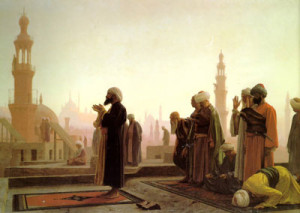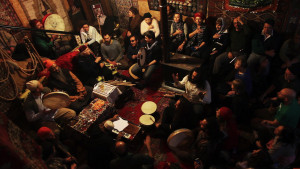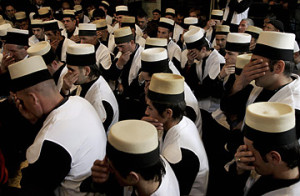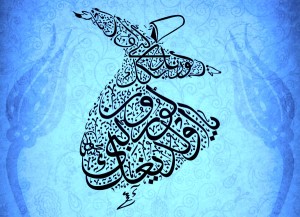The Foundations of Sufism are: Tawheed (oneness of God), Wahdatul wujud (unity of existence), ilmul yaqeen (knowledge with firm faith), zikr (incantation), muraqaba (meditation), observance of taqwa (God-consciousness) and tawba (repentance on sins), ikhlas (sincerity), tawakkul (contentment), sidq (truthfulness), amanah (trustworthiness), istiqamah (uprightness) and shukr (thankfulness).
Sufi saints disseminated their pluralistic messages in the Indian subcontinent at a time when the idea of religious tolerance was not even debated in a large part of Western Europe. They laid greater emphasis on the broader Qur’anic notion of wasatiyyah (moderation in life) maintaining a moderate narrative of Islam. It exhorts man not to transgress the limits determined by God. Since the Sufi saints practiced this spiritual Islamic principle in its entirety, they shunned all forms of extremism (tatarruf), harshness (tanattu), violence (tashaddud) and exaggeration (ghuloow) not only in matters of faith, but in all walks of life. They believed that spirituality is a luminous and universal body of truths that wins the hearts. However, they strongly disagreed with the practices of subjecting spirituality to any narrow interpretation of religion. They rather advocated the universal values of religion that reach the minds and the hearts of people beyond man-made distinctions’. Thus, they found the solution to human problems both of material and spiritual nature, in their spiritual reading of Islam.
Indian Sufi saints inspired a huge following by their theory of sulh-e-kul (peace for all), a Sufi term that essentially means: love for all and hatred for none. This greatly impacted their attitude towards other faith traditions. Indian Sufis were keen to share commonalities with adherents of other faith traditions they encountered in the subcontinent, notably the yogis and the mystics of the Vaishnav tradition, both influential in this land of age-old Vedic tradition. Their liberalism was beautifully reflected in their halqas (sessions) of harmonious Sufi music or the sima, against the vehement opposition from the orthodox ulema. Since the Sufis were practitioners of the spiritual doctrine of Wahdatul Wujud (the unity of existence), they strongly believed that the light of God is present in all creations and, thus, taught their followers to respect people of all faith traditions.

As a result, they were loved and admired by all and sundry. People of all caste and creed, faith and tradition were equally inspired by the immense sincerity and simplicity in the lives of these mystically-inclined saints. Imbued with the lofty mystical experiences, Indian Sufis lived by the Prophet’s ideals of simple living. They renounced the extravagant and wasteful aspects of life and followed the higher humane ideals in an effort to serve humanity at large. They also exhorted their followers to live by the same ideals, leaving behind glorious examples for others to emulate. The very spiritual epithet “Sufi” is literally driven form the Arabic word “Suf” meaning wool, the preferred clothing of Sufis. They used to shun attractive clothes made of silk and other fineries. But this line of thinking was not an outcome of any ascetic approach of life. They were, rather, inspired by the Qur’anic exhortation that unveiled the deception rooted in the life of the glamorous world.

What actually appealed to all Indian peoples, regardless of caste and creed, was the Sufis’ spiritual legacy of humanism and social activism. The Sufi saints of India combined their mystical search with a spirit of social service. It was upheld by their shrines and khanqas running across the country as seminaries (madrasas) of mystical learning, experience and enlightenment. The curriculums of those madrasas were so broad and inclusive in their worldview that students and disciples from all backgrounds were cordially welcomed. Devotional songs were composed there in different vernacular languages and Sufi music (sima’) was considered a manifestation of complete submission to God.

The great Sufi saint who had a fair share in preaching Sufism in India was Khwaja Muinuddin Chishti of Ajmer, who left his abode, Herat in Afghanistan, in search of higher spiritual learning and experience. Having visited the central Islamic seminaries his time, travelling all across Central Asia to the Middle East, Khwaja sahib attained solace in India. He gave a definite turn to the Sufi narrative of Islam by introducing the element of ecstasy and the mystic doctrine of the immanence of God. Inspired by the early Sufi masters, notably Khwaja Usman Haruni, he focused on the loving devotion to God, discipline of the individual soul and brotherhood of mankind. Consequently, his mystical mission fostered amicable understanding between Muslims and non-Muslims. At a time when India was struggling to rise above the differentiators of cast and creed, the Sufia-e-Kiram stressed on the essential Qur’anic message of equality and prophetic saying that “All mankind is one family of a God”.

Thus, one of the most glorious impacts of Sufi saints on Indian society was the widespread phenomenon of social integration between common Muslims and non-Muslims. Even many non-Muslim brethren, particularly Hindus and Sikhs, chose to become Murid (disciples) of Sufi saints. It was the mystical impact of Sufism on composite Indian culture and society that inspired the Bhakti movement in southern India first and then in northern India. Even Sikhism preached by Guru Nanak was highly inspired by Islamic mysticism (tasawwuf) due to its emphasis on monotheism and rejection of caste system and idol worship. However, among all the mystical movements and spiritual interpretations of different faith traditions, the common cause was the stiff opposition to the priestly domination and obsession with false rituals and dogmas.

Sufis espoused one of the foundational principles enshrined in Islam: freedom of religion. They maintained and encouraged the view that coercion in matters of religion goes against the spirit of every religion. They believed that the true believer is truly free. That is to say, freedom is increased to the degree belief is strengthened. The notion of freedom was so endeared by the Sufi saints that a Turkish Sufi, Saeed Nursi described it as the most important principle in life. He proclaimed: “My freedom, which I am most in need of, is the most important principle in my life. I can live without bread, but I can’t live without freedom.” It is also gratifying to note that the Indian Sufi saints encouraged the rationalist and non-conformist elements in society. For instance, Hazrat Nizamuddin Aulia followed an inquiry on the laws of movement, which displayed a remarkable degree of empirical thought.
India has been the land of mystics and Sufi saints. Sufism is anchored in humanism, universal brotherhood, peace and pluralism, compassion, goodwill and tolerance. It’s in perfect harmony with the composite Indian culture. Sufi teachings are based on pluralistic traditions that are in sync with the notion of unity in diversity. Sufi saints preached moderate, progressive, multi-cultural and pluralistic Islamic tradition, which was the sole reason behind its popularity in the land of Vedic culture. Muslim mystics, dervishes and fakirs reached out to every section of Indian society to imbibe the universal values of infinite love, mutual respect, interfaith harmony and social affinity. They had no room for retrogressive precepts and ritualistic practices in the name of religion. Thus, their messages stressing the essential and egalitarian values of Islam — peace, pluralism, human equality, social justice and brotherhood of mankind — attracted countless numbers of Indians.
In contemporary India the impact of Sufism can be seen through the prism of arts and culture. The multi-faceted Sufi tradition reflects an essentially pluralistic and composite culture that connects people of this country beyond a great many barriers. The most redeeming features of Sufism’s appeal in India, as anywhere else, are its inherent openness, wide embrace, tolerance and its accommodating nature. Therefore, it is rightly considered a completely peaceful, non-confrontist and inclusive spiritual trend. No wonder then, a great many Indian Sufis, like Khwaja Gharib Nawaz Moinuddin Chishti of Ajmer, Baba Fariduddin of Pakpattan and Delhi’s Qutbuddin Bakhtiyar Kaki, Hazrat Nizamuddin Aulia and Chiragh Dilli left an everlasting and magnetic impact on the elite and common masses alike.

However, one regrets that the true spirit of Sufi culture and tradition in the country is now beginning to wean off. It has been reduced to only occasional shrine visits, spiritual consultation or observance of particular routine rituals and festivals. Today’s fakirs and pirs seem to have done away with their effort to keep alive the Sufism-inspired mystical culture of pluralism and moderation. Though they still engage in their occupations in the mazars that outnumber even mosques and madrasas in some areas, they seem to have lost their impact. Now their role is reduced to being peer-o-murshid (spiritual guru) to those who seek consultation in relation to their mundane worldly affairs. Since today’s Sufi masters, pirs and fakirs are no more anchored in the influential spiritual inclination, moral and ethical deterioration is taking roots. More regrettably, a note of introspection is completely missing on their part.
Needless to say, Sufis and all mystically-inclined traditions of India have to reclaim and strengthen the spiritual foundations on which they are based. We should engage in creating a global spiritual fraternity through tawheed (oneness of God), wahdatul wujud (unity of existence), ilmul yaqeen (knowledge with firm faith), zikr (incantation), muraqaba (meditation), observance of taqwa (God-consciousness) and tawba (repentance on sins), ikhlas (sincerity), tawakkul (contentment), sidq (truthfulness), amanah (trustworthiness), istiqamah (uprightness) and shukr (thankfulness). This is the higher spiritual state in which a Sufi draws closer to the Almighty and receives serenity and infinite grace gifted by Him.
A Sufi who had promises to keep
One of the greatest Sufis of Islam was Sheikh Abdul Qadir Jilani, also known as Ghaus-e-Azam (may Allah be pleased with him)AR .
He founded the largest Sufi order Qadriya that has been the most tolerant, harmonious and charitable of all the Sufi orders. An extraordinary incident of his early life teaches us a noble spiritual lesson.
His mother, Ummul Khair Fatima, wanted him to be a man of knowledge and wisdom. Preparing him for a long journey towards a city of learning, she took 40 dinars and sewed them under the arm of his coat, giving him the following advice: “O my beloved son! I want you to always speak the truth.”
The young Abdul Qadir Jilani bid farewell to his mother and joined a caravan, which was on its way to the city of Baghdad. In those days, long routes passed through dense forests and jungles and robbers and bandits used to rob the caravans.
Abdul Qadir’s journey took him into a vast forest wherein his caravan was attacked by a band of 60 looters.
The head of those robbers was notorious for mischief-making. Unable to defend themselves, all travelers of the caravan surrendered and handed over their belongings to the bandits.
Most of the bandits ignored him. After a long while, one of the robbers asked him if he had anything. The young boy said that he had 40 dinars. Amazed at the boy’s truthfulness, the head of the robbers asked him: “O young boy, none of us knew that you had any valuables. Despite knowing that we are looters, why did you disclose it?”
The young boy replied: “When I set out for this journey, I had promised my mother that I would never tell a lie, come what may. How, then, could I deceive my mother for the sake of money?”
Hearing these sincere and spirited words from a boy aged 13, the head of the bandits felt extremely ashamed of his age-old wrongdoings. Filled with shame and regret, he said: “O little boy! You are so loyal to your mother that you cannot break a single promise for her. How cursed and mean I am that I have been disobeying my God for long years.”
Written beautifully By:
Ghulam Rasool Dehlvi


